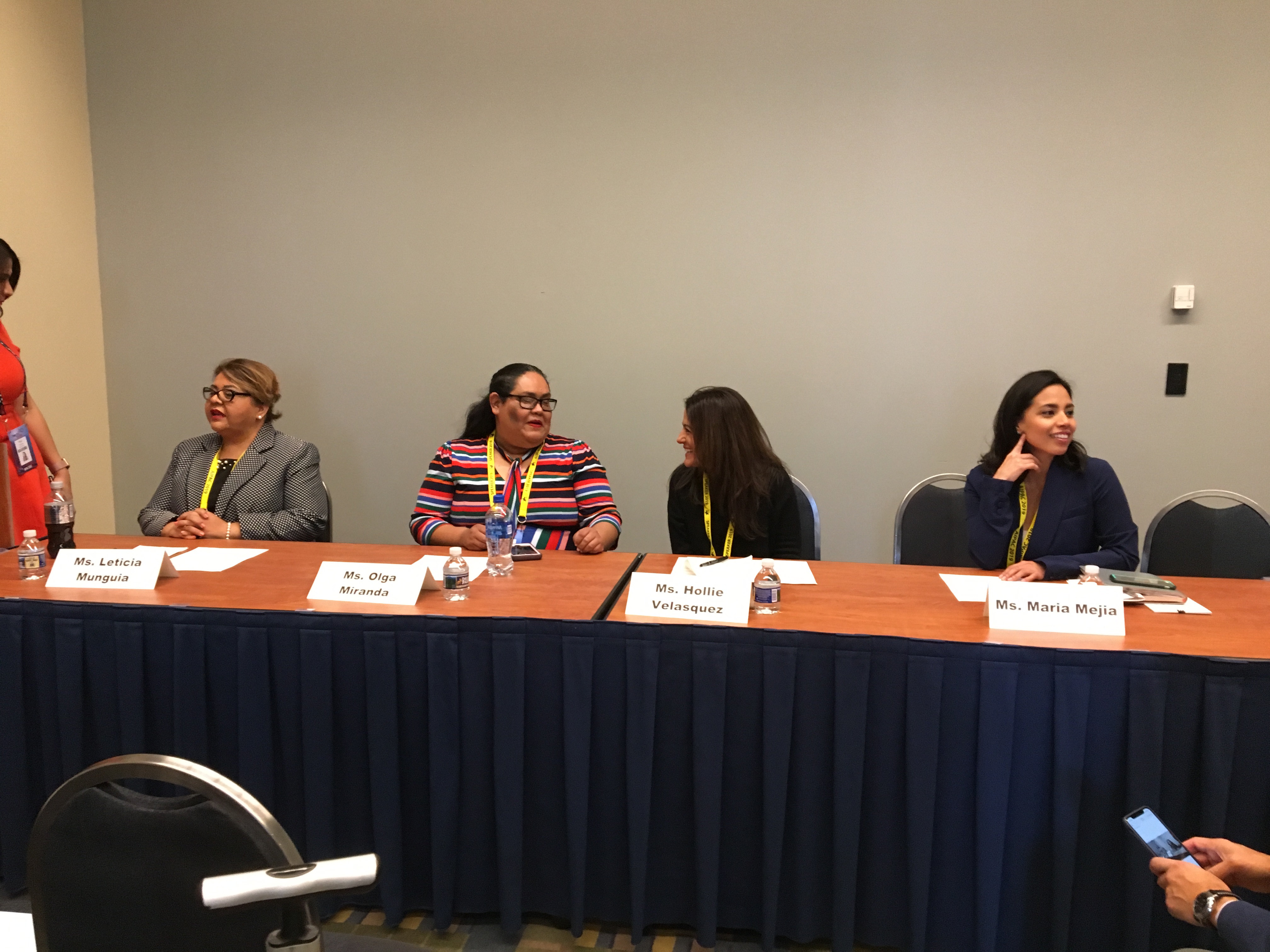 L-R: Leticia Munguio, Olga Miranda, Hollie Velasquez, Maria Mejia
L-R: Leticia Munguio, Olga Miranda, Hollie Velasquez, Maria Mejia Washington, D.C.: Why would Latina women be so invested in supporting Israel? Four Latina women who spoke at this year’s AIPAC conference, laid out their reasons with passion, conviction and a sense of pride. All have visited Israel and said they have come away with a greater understanding of the Jewish State and why it’s important to be an advocate for it.
“I’ll be frank with you,” said Olga Miranda, president of the Service Employees International Union Local 87 in San Francisco. “Even when [Latino AIPAC supporters] walk the halls of this convention, people are looking at us [thinking] so why are you here?”
Why indeed?
“We as Latinos have always identified with the underdog,” Miranda continued. “Because it’s a damn struggle, to be brown, to be a woman but we have positions of strength and power.”
That, she said, is something she really saw in visiting Israel. Having been raised in Los Angeles, Miranda said, “To hear their stories of life in Israel was critical for me.” Hearing how children there deal with rocket attacks and constant threats and fears that maybe your children’s bus could be bombed on the way to school is something that “mothers in East LA, Compton, South Central and Echo Park can understand.”
For Hollie Velasquez, an energy and gas utility executive from Colorado who has a background in politics, including at one time working for now Democratic presidential candidate John Hickenlooper, her first Israel trip last July was also an eye-opener and fueled her passion to stand up for Israel.
“I learned that everyone serves in the military at the age of 18,” she said. “And the concept of women being there with them [made me think] tactically about their military and the strategy that goes beyond understanding the dynamics of what’s going on around the country and how everybody care about you.”
Coming back to the United States, she said, “to hear conversations about ‘this person can’t serve in the military and that person can’t serve in the military,’ — that’s crazy.”
She said she’s still trying to deal with the notion that you can exclude people in [America] based on what they believe or how they look and then “to go to a country where you do not see that is something I deeply connected with. What it means to value women as partners in Israel I think is something we can continue to think about and grow.”
Panel moderator and participant Maria Mejia, spoke a lot about the ties that bind Latina women, the Jewish people and the State of Israel. Mejia is the Los Angeles director for GenNext, a national community of entrepreneurs that focuses on education, economic opportunity and global security for future generations.
“Through GenNext and AIPAC I have pretty broad exposure to foreign policy and national security conversations at every level,” Mejia said. “About what’s at stake when communities like ours are not engaged.” That’s why, she said, she sees the “power and potential for what I like to call the emerging Latina diplomatic voice to strengthen the America-Israel relationship.”
She added, “I tell people, ‘you have to go to Israel.’ Being there and feeling it and seeing it is what gives you perspective and [shows] how important the relationship between Israel and the US has to be.”
Leticia Munguia, field director for the California State Employees Association in San Diego, said she saw connections with the Latino community and Israel through the work she has been involved in her whole life as the child of immigrants and working for service workers: janitors, bus drivers, kitchen staff, who have to fight for rights.
“I think there are many generations throughout this [AIPAC] conference where we can learn from each other,” she said. “Worker rights, economic rights, social justice are integrally related to the fight for Israel and making sure that we make it stronger.” That relationship, she added, “only comes together one relationship, one conversation at a time.”
She added that Latinas can bring a lot to the conversation about Israel because, “as a Latina working in labor, we bring our experience of multi-ethnic, multi-language and multi-cultural ties.”
Mejia said there is much that Latina women can take from Israel, too, noting that Israel tends to be more progressive than not only its neighbors but also the United States, “from the right to vote to electing their first female prime minister and having women serve in the military.”
Miranda added, “We’re very behind as far as women in leadership, in the administration, how commissions are selected, even on a local level. We’re very behind because we’re not pushing as strongly as we should whether we’re Latinas or not. Israel having had Golda, we’re still waiting for our own [Golda].”
Despite all the support by the women on the panel for Israel and AIPAC, Mejia posed the question: What can the AIPAC community do to help each of you navigate the [anti-Israel] pushback you receive?
Miranda said that the community has been attacked through affiliate unions on “how they view Prime Minister Benjamin Netanyahu and his opinions. They have really marked our community of immigrants,” she said.
She added that she has spoken with other Latino AIPAC participants. “We’ve sent several letters to the leadership of AIPAC saying we are taking on a fight not just the everyday fight of our respective communities but also the fight of Israel, but when we hear the Prime Minister make these kinds of comments like “the wall should have been built a long time ago,” that’s something we take offense to.”
While Miranda said they have “stood their ground” when it comes to defending Israel, “we also need for the Jewish community to stand theirs and understand what our issues are.”
She added, “No matter what, my personal commitment to AIPAC and to Israel is because even though there aren’t a lot of people fighting for my community, my mother always taught when there is something wrong, you step up, and we as a community have always done that.”























 More news and opinions than at a Shabbat dinner, right in your inbox.
More news and opinions than at a Shabbat dinner, right in your inbox.